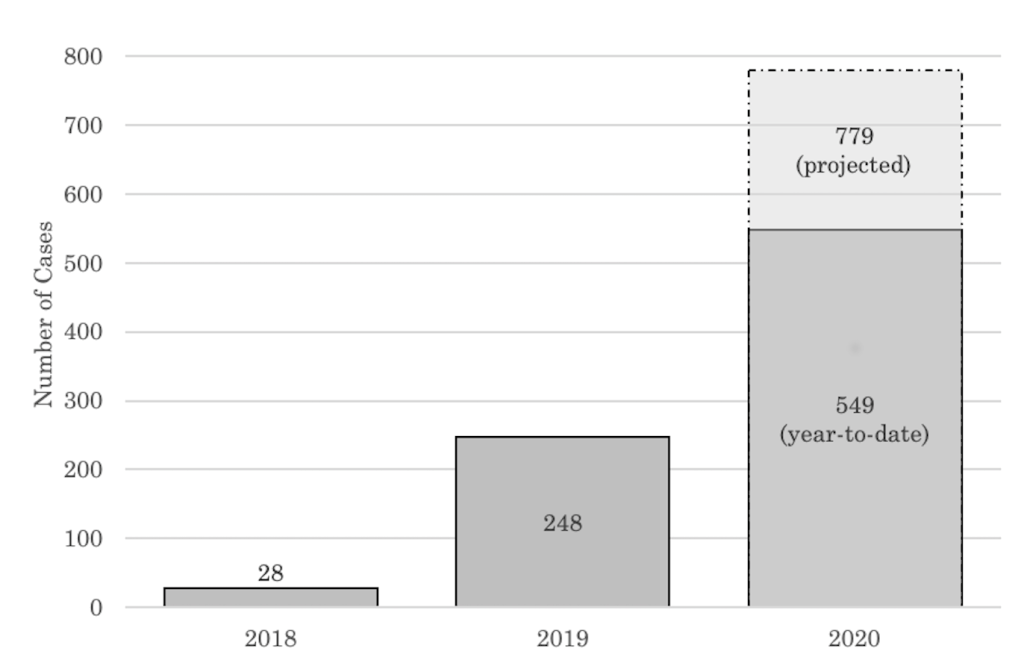Move over, Marshall, Texas. The new capital of American patent litigation is Waco, Texas. Waco’s sole federal judge, Alan Albright—who took the bench less than two years ago—now hears more patent cases than any other judge in the country.
It’s all happened quickly. As recently as 2018, the Western District of Texas, which spans from Waco, Austin, and San Antonio in the central part of the state, to El Paso in its far western reaches, received only 90 patent cases, a mere 2.5% of patent cases filed nationwide. Two years later, the Western District is on pace to receive 850 patent cases by year’s end, roughly 22% of patent cases filed nationwide and more than any other district in the country.
Practically all of those cases are on Judge Albright’s docket. As the figure below shows, the Waco Division received a mere 28 patent cases in 2018, the year he took the bench. If current trends hold, Judge Albright alone will receive 779 patent cases in 2020, an increase of 2682%!

The explosion of patent cases in Waco—the vast majority of which are filed by non-practicing entities—is fueled by Judge Albright’s concerted efforts to attract patent plaintiffs. He has been explicitly advertising his district—through presentations to patent lawyers, comments to the media, procedures in his courtroom, and decisions in patent cases—as the place to file your patent infringement lawsuit.
In a draft article, now available on SSRN, we identify five reasons why the Western District is attractive to patentees and explain why they are problematic:
1. The Western District’s case assignment practice enables plaintiffs to predict—with absolute certainty—that Judge Albright, not any of the 16 other judges sitting in the district, will hear their case. All they have to do is select “Waco” from the drop-down menu on the court’s electronic filing system and the case is automatically assigned to Judge Albright.
2. Judge Albright has adopted a fast-track scheduling order that sets deadlines useful to patentees seeking to elicit quick settlements and avoid PTAB review.
3. Venue transfer decisions: Judge Albright rarely transfers cases out of the Western District of Texas (only 3 of 14 inter-district transfer motions have succeeded to date), a practice also used by judges in the Eastern District of Texas during its heyday as the go-to district for patent litigation. More remarkably, Judge Albright regularly transfers cases filed in the Western District’s Waco Division to its Austin Division while retaining the case on his own docket (50 cases and counting so far).
It’s worth pausing to emphasize what this means: patentees are filing in Waco to guarantee Judge Albright is assigned to the case. But they do not actually have to litigate in Waco to keep the case in front of Judge Albright. Rather, they can ask him to transfer the case to the more desirable locale of Austin and he will do it as a matter of course—even though, if the case had been filed in Austin originally, there is zero chance Judge Albright would have been assigned to it.
4. Judge Albright seems reluctant to stay litigation pending related disputes in other forums, such as the PTAB, not just because of the aggressive schedule he sets but also because of a normative belief that patentees have a constitutional right to have a jury decide patent validity.
5. Judge Albright has never invalidated a patent on eligibility grounds (10 motions, 10 denials), even though many of the patents being asserted are the “do it on a computer” patents at which the Supreme Court’s Alice decision was most directly targeted.
Though many reforms could help solve these problems, we focus on two.
First, there’s surprisingly no law that requires cases to be randomly assigned among judges of a particular district. Mandating random assignment would curb the judge shopping that incentivizes judges to distort procedures and the law for the specific purpose of attracting litigation.
Second, venue in patent cases should be tied to geographic divisions within a judicial district, not just the district as a whole. As applied to the Western District of Texas, that reform would thwart the tactic of using a defendant’s activities in Austin to establish venue in Waco for the sole purpose of shopping for the Waco division’s only judge.
The article in its original form can be found here.
Paul Gugliuzza is a Professor of Law at Temple University Beasley School of Law. His areas of expertise include Civil Procedure and Intellectual Property.
Jonas Anderson is the Associate Dean for Scholarship and Professor of Law at American University Washington College of Law. His areas of specialization include Property Law and Intellectual Property.
